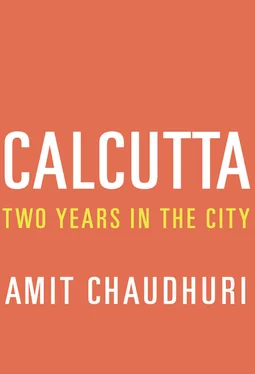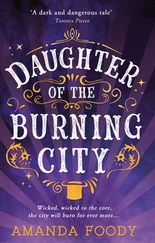Samirda joined Martin Burn in 1956, soon after returning from Cambridge. Many of the male members of his father’s generation, and his grandfather’s, presided over this company in positions of power. Samirda, however, was content not to leave his mark; he was merely, as he puts it, “visible” in the office. In Cambridge, he’d had an astonishingly good three years. Still not entirely comfortable with the opposite sex, he’d gone merrymaking and drinking with his upper-class English friends. He’d come back to Calcutta from Trinity with a Third in History (“Wasted an opportunity to learn anything”). Then he settled tentatively into employment, into becoming strategically, and merely, “visible.” But he continued, nevertheless, the business of enjoying himself: of flirting with the pretty taansh or Anglo-Indian secretaries, of listening to Pam Crane singing at Trinca’s at Park Street, of eating out at Firpo’s and the Skyroom. In other words, instead of pursuing his ambitions (he tells me he had none), he set out to take pleasure in the bits of the city he delighted in. He couldn’t have known, then, that the city — eventually a certain stretch on Lower Circular Road, leading from the Mouchak sweetshop towards Exide Batteries and Calcutta Club — would become, over the next five decades, his permanent abode; that he’d go away from it less and less, even for holidays. He was a bit like the traveller in the de Chirico painting that V. S. Naipaul invokes, “The Enigma of Arrival,” where, according to Naipaul, the visitor to the city in the picture, with a ship in the background, gradually forgets he’s supposed ever to go back — except that Naipaul’s visitor is a migrant, while Calcutta, to Samirda, is home, and it was home he wouldn’t be leaving. For isn’t the idea of home premised upon departure, and travel upon the possibility of return, and the foreclosing of that possibility? Although he’d often enlighten our teas with his heavy, dramatic nostalgia for England, Samirda had forgotten, in some basic way, that it isn’t necessary to live and die at home. In that sense, and other ones, the Calcutta he inhabited when we first met him in 1993 wasn’t a real one.
* * *
By all accounts, he’d begun to lead a secret life at Martin Burn. He’d become a regular reader of Encounter . He also became an executive in the purchase department of Indian Iron and Steel, an important subsidiary of Martin Burn, but spent much of his time making conversation with the clerks, some of whom, deceptively unprepossessing, were startlingly well read and genuine enthusiasts. He himself had embraced Evelyn Waugh— A Handful of Dust , et cetera. From the crowded shelves of the Calcutta Club library he’d pick up writers in vogue who are no longer read today — as is the fate of most authors stocked in clubs — writers like Elspeth Huxley, for instance. Then he contracted polio and experienced pain and, almost for the first time, hours of palpable boredom; this must have been easily alleviated by human company, however, no matter if the company comprised doctors, because he recalls them noting he was cheerful and jovial even in his discomfort. I can’t imagine Samirda not being polite, despite being in the presence of doctors, because politeness is a sort of oxygen for him, and he derives from it both happiness and a reason for being. He’s better at it than most people I know. And the matter of happiness: it’s true — I’ve sometimes wondered if he’s incapable of being unhappy. It’s not the contentment of a man who’s achieved something, or the natural well-being of an altruist, or the joy of a mystic whose source of pleasure is elsewhere, or in the divine: it’s something else. Perhaps it’s a deficiency. It’s the strange contentment of one who’s largely happy to be alive, to be helped by his wife on and off the bed (after polio, he acquired callipers for his legs, and, for many years, walked for short stretches with a stick), to offer a vicarious sort of hospitality to his guests, to be, in the best sense, even when his powers were diminishing, perpetually on the mend.
When we first met the Mukherjees, Samirda was largely home-bound, but still making the occasional excursion — twice a month to the Calcutta Club, for instance. Samirda and I had brief discussions about the club, because we had a minor difference of opinion about the sort of recreation and relaxation it offered. Having then just become a member myself, I had no real moral leg to stand upon; but I still hadn’t forgiven the club for throwing me off its premises repeatedly in the seventies when I would come visiting from Bombay in the obligatory costume of the teenager: kurta, jeans, and chappals. What put me in a perverse militant mood each time I approached the Calcutta Club in that decade was not just the obfuscatory regulation concerning attire that inevitably denied me entry — clearly I already knew the regulation and what was awaiting me from each previous experience I’d had, and was deliberately, with the bit of Quixote in me that every person has, going clubward looking for a joust — it was the high-handed way I was disposed of I had most trouble with. I’ve been twice to the Athenaeum in London on a lunch invitation and lent a jacket and tie both times at the entrance by staff who had an air of brisk understanding and commiseration. At the Calcutta Club, I was treated as millions are daily in India: as one intrinsically below par. Then, in a final act of subterfuge, I became a member, before membership became unaffordable. Even so, I felt staff recognised me, with their unerring instinct, as one who’d taken up membership not for the usual reasons, but suspect ones. This staff is mostly new, and ignorant of my history; but I believe they have found me out, and the first thing they do when I step into the club is gaze steadily at my feet, to check, presumably, if I’m wearing shoes, strapped sandals, or the inadmissible strapless sandals. I’m clearly capable of anything. Now and then I will have a complaint whispered to me by a steward, that what I’m trying to pass off as my trousers are actually jeans. Both the staff and the club’s members are great connoisseurs of people who are pretending to wear one thing but are actually wearing another, of those who look, to the untrained eye, rule abiding, but are not.
Samirda, though, was well loved at the club — with good reason: he was still “impeccably turned out,” as Anitadi had noticed on their first meeting; he was charming; he hailed from a distinguished Calcutta family — and the receptionists and khansamas who studied me with icy contempt wouldn’t have dared greet him with anything but a smile.
But it was becoming increasingly difficult for Samirda to climb up the steps to the foyer without help or without drawing excessive attention to himself. Steps, now, were a ubiquitous impediment to his enjoyment of society. He refused dinner invitations, including mine — God knows I wanted to reciprocate in kind what had by now become substantial cups of tea and a limited but delectable array of sandwiches — but he turned down these invitations whenever he had a premonition that steps were involved. And since he didn’t like the fuss made over him at the Calcutta Club—“spectacle” was the word he used of himself — he stopped going there by the end of the nineties.
More and more, over the years, when we went to visit the Mukherjees — perhaps three or four times annually, perhaps more, perhaps less — I had the sense of a man in a very particular kind of space: living in Calcutta, but a Calcutta he saw relatively little of, a city reported on by a stream of visitors and read about in the morning newspaper. The city I’d moved to in 1999—Kolkata — he hadn’t experienced much of first-hand. Yet he couldn’t help being of it — despite the fact that the Cambridge of the fifties, with its “old chaps” and “backs” and cycling students, was still very — almost ludicrously — real and immediate to him. I’d just moved back from Cambridge, in fact: a wet, miserable, redneck town as far as I was concerned, which became inert and ear-splittingly silent after six in the evening. But the way Samirda questioned me about it made me realise that he presumed I’d returned from the Cambridge of the fifties, with the same people going about their business, without hiatus or interruption, today as they had then. Similarly, when I mentioned my ongoing trips to Europe, he couldn’t understand why I so hated travelling. He’d gone to Europe once, at the end of his Cambridge stint, with his father and brother, passing through Austria and being astonished by the glamorous Alps, catching a glimpse of snow, a great valedictory passage, without him necessarily thinking of the tour in those terms at the time. Now he wanted to know, rapt, whether it was that Europe I was flying to. He had trouble believing it was anything else. Did the pâté de foie gras and the strawberries not have the same flavour?
Читать дальше












